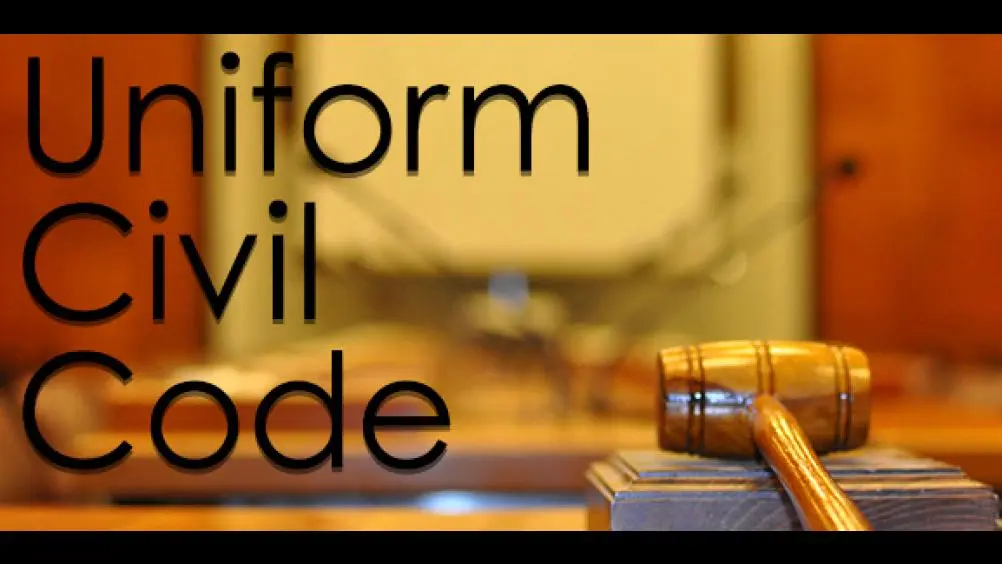Bengaluru, NFAPost: In a bid to create a more inclusive and uniform legal system, India has been grappling with the idea of implementing a Uniform Civil Code (UCC). The UCC aims to establish a set of laws that would apply to all citizens of the country, irrespective of their gender, sexual orientation, or religious affiliation. Currently, personal laws in India are governed by religious texts, which has led to disparities and inconsistencies in various aspects of civil law.
The concept of a Uniform Civil Code in India can be traced back to the British government’s 1835 report on colonial India. At that time, the report suggested that the personal laws of Hindus and Muslims be kept outside the scope of codification, emphasizing the need for uniformity in other areas of Indian law. However, it was not until the later years of British rule that the issue gained significant attention.
In 1941, the B.N. Rau Committee was formed to codify Hindu law, primarily due to the increasing legislation addressing personal concerns towards the end of British rule. The committee recommended equal rights for women based on scriptures and suggested the establishment of a civil code for Hindu marriage and succession, revising the existing 1937 Act.
The recent proposal for a Uniform Civil Code was introduced in the Rajya Sabha by Kirodi Lal Meena, a member of the Bharatiya Janata Party (BJP). The bill aims to create a commission tasked with drafting a UCC applicable nationwide. The choice of the Rajya Sabha was strategic as it mentioned the creation of a national inspection and investigation commission to develop a uniform civil code.
However, the proposal has faced significant opposition from Muslim organizations and other conservative religious groups. They argue that the UCC undermines the autonomy of religious communities and their right to practice their laws, which govern marriage, divorce, inheritance, adoption, and maintenance. They contend that personal laws should be distinct from public laws.
One of the main arguments against the UCC is that it infringes upon the right of citizens to practice the religion of their choice. Critics argue that it goes against the principles of religious freedom enshrined in Article 25 of the Indian Constitution, which guarantees the autonomy of religious organizations and their unique cultural practices under Article 29. Tribal organizations have also expressed concerns about the potential imposition of a uniform code on their traditions and beliefs.
Proponents of the UCC argue that it aims to safeguard vulnerable communities, including women and religious minorities, as envisioned by Dr B.R. Ambedkar, one of the framers of the Indian Constitution. They believe that a uniform code would simplify the complex regulations governing marriage, succession, inheritance, and adoptions, ensuring equality and justice for all citizens, regardless of their religious affiliation.
The Indian Constitution, while guaranteeing religious freedom to its citizens, also requires the state to apply directive principles and common law for all citizens, as stated in Article 44. However, the implementation of a Uniform Civil Code remains a contentious issue, with various interpretations of constitutional provisions and competing interests.
The debate surrounding the UCC also holds implications for the LGBTQIA+ population in India. The existing laws in the country do not recognize same-sex marriages as legal, but the UCC, by not making distinctions based on gender or sexual orientation, provides hope for greater inclusivity and equality.
Personal laws in India were primarily drafted during the British Raj, with separate laws for different religious communities. Goa, which was under Portuguese rule, retained its unified civil code, making it the only state in India with such a provision.
The issue of a Uniform Civil Code gained prominence after the landmark Shah Bano case in 1985, which raised questions about the application of certain laws without compromising the fundamental right to freedom of religion. The case specifically drew attention to Muslim Personal Law and its allowance of unilateral divorce and polygamy, which are considered aspects of Sharia law.
Efforts to introduce a Uniform Civil Code have been made in the past, but they have not been successful. The Hindu Code Bill, introduced after India’s independence, aimed to reform and codify personal laws for various sects of Indian religions, excluding Christians, Jews, Muslims, and Parsis. The bill, particularly the Hindu Succession Act of 1956, brought about significant changes, including granting women property rights and equal inheritance.
It is essential to understand the distinction between civil laws and criminal laws in India. While criminal laws are uniform and apply to all citizens equally, civil laws are influenced by faith and are governed by personal laws. These personal laws are derived from religious scriptures and shape matters such as marriage, inheritance, adoption, and property ownership.
The proposal for a Uniform Civil Code in India continues to generate vigorous debate, with arguments centred around religious freedom, cultural autonomy, and the quest for equality. As the country navigates this complex issue, it must strike a delicate balance between upholding individual rights and ensuring a more uniform and just legal system for all its citizens.





